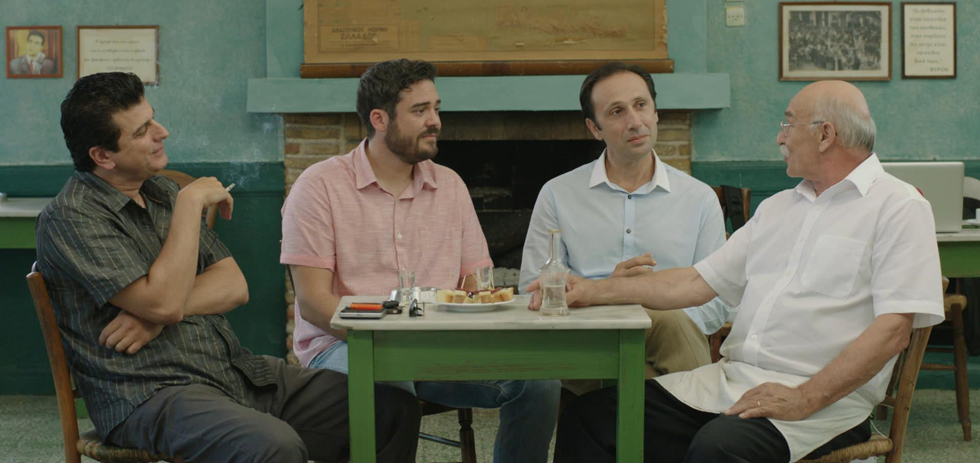
Common Denominator‘s starting premise is four different men meeting in a coffee bar and discussing life, love, and the opposite sex. It’s a time-honoured and theatrical tradition for a feature to bound itself in the one scenario, but it presents the challenge of creating a consistently interesting narrative with very limited contextual tools. It also has to broach those literal barriers and discuss more universal themes with the evocation and intelligence of healthy debate. Common Denominator clearly has its eyes on the stars in that respect, gunning for universalism right from its dopey opening zoom from planet Earth down to ground zero in the Greek hills. Despite its best efforts, through a decent spectrum of discursive viewpoints and an ostentatious late twist, it lets itself down with wonky, obvious film-making and a groan-worthy conclusion.
The movie is undoubtedly a low-budget affair, shot in plainly-lit Arri Alexa, and never leaving the cafe’s immediate surrounds for even a flashback. You can forgive a stingy production if the story is really compelling though, and amid the simple staging are hints of a productive discussion between the four men, who aren’t really inriguing characters on their own but contrast against each other well enough to function. Oafish Nikos, freshly bitter from a breakup, oscillates between a chauvinist strawman and barracker for loving on impulse. Wet blanket Alexandros dispenses good-guy wisdom, but has little practical advice that he can’t act upon with his MacBook, from which he spies on his online lover. Dmitros is the disciplined but restrained realist playing the long game through a two-year relationship, and Platonas is their sagely moderator, as well as a widower with some lessons of his own.1 Their chat takes on a good enough progression – from snap judgements about women, to recognition of the limits of their own experiences, to pondering on the causes of happiness – and it’s paced effectively enough to know when the characters should slam the table or put a tray of raki on it.2
The dialogue-driven format and Mediterranean setting begs inevitable comparisons to last year’s Before Midnight, though you should only expect something as talkative and nowhere near as elegant. It’d be wrong to demand magnificence from a first-time writer-director-producer (Sotiris Tsafoulias), but it makes some choices that are bafflingly, almost satirically overt. This is the kind of movie where the set has philosophers’ quotes literally framed and hung on the walls, and Platonas is nicknamed “Mr. Plato” in a parallel lost on no fools. Then, as if that weren’t rank enough, the score cuts in to punctuate moments in the most howlingly melodramatic way imaginable. Its favourite technique is to throw up an electric-guitar lick when shit’s about to go down, which is just as affecting here as when every after-school kids show did it in the 90s. It’s amateurish, for sure, but given the mannerly characterisation and performances on display, it’s tolerable.
Tolerable, that is, until the twist arrives, which in good hands could have made for a Gone Girl-esque slaying of the problematic gender stereotyping involved in any “battles of the sexes”. In Tsafoulias’ hands, it shrugs at offering such a critique and dwells in a wishy-washy humanist stupour. “I dunno about inequality between the sexes,” his script meekly says, “but I know everyone’s got it hard sometimes, and that’s the truth.” In taking the safest escape route, it just upholds a smug, daddy-knows-best worldview as though it were a maxim and not antiquated rubbish. Adding to the confounding feel of the moment is the fact that the plot curiously forgets a handful of ancillary performers it introduces early on: a pair of grouchy seniors rolling dice, a dowdy tracksuit wearer who nicks off to gainful unemployment, and a cute dog (because we can all agree that dogs love best). They all feel either arbitrary or unnecessary, and I get the sense they’re around to give the location some flavour beyond the four guys yammering at its centre, but the event’s laughably contrivance comes off even more like a jarring redirection as a result.
I can’t fault Common Denominator for its minimalist ambition, but I found myself laughing at it more than its makers surely intended, and it goes beyond its off-kilter subtitling to indicate significantly awkward issues.3 The weird mix of noble intention and awkward, cheap execution is amusing enough to save it from being unbearable, but condemns it also to forgettable purgatory.
